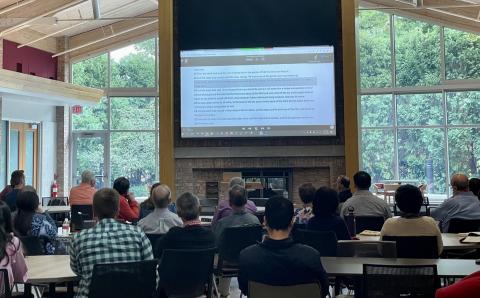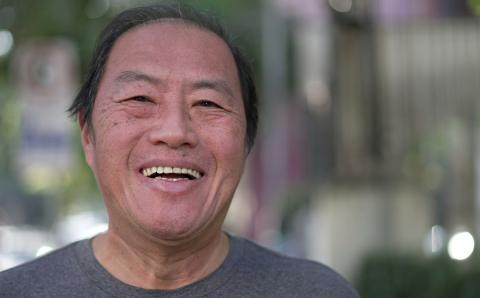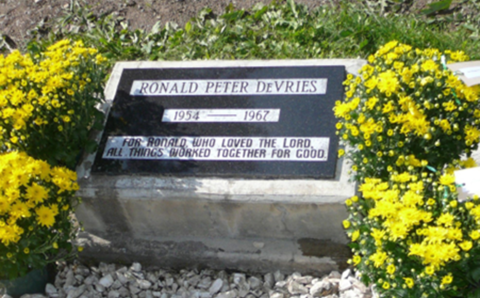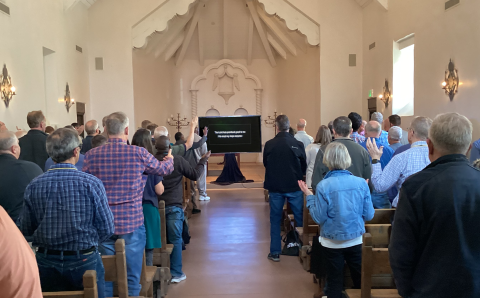For a moment, she forgets that she’s in exile as she plucks the smooth, red pomegranate off the
branch, with its little crown and promise of juicy red pearls. Forty years have passed, and the Israelites’ deliverance is coming. But 30 years of exile remain. The prophet Jeremiah’s words, regularly recited by her mother, now echo in her head: “Build houses and settle down; plant gardens and eat what they produce” (Jer. 29:5). That’s what her family’s life is: settling as exiles in a foreign land, building houses, planting gardens, harvesting their produce, and waiting to return home.
I inhale the basil plant’s fragrance as I snip off its flowers and remove the leaves nibbled by
insects. Time seems to slow down. The plant glows in the afternoon sun, and my breathing
becomes rhythmic. I love this garden that bursts at the seams with tomatoes, greens, peppers, squash, and sunflowers. What would it be like to stay put long enough to cultivate a garden? I wonder.
Gardens usually require a faithful gardener to water the plants, tend to diseases, prune branches, ward off insects, and harvest produce. If the gardener neglects to care for the garden, it suffers. Yet many young adults today don’t fully know how to be God’s (spiritual) gardeners. We don’t know how to care for others’ needs, our lives, and God’s creation. We move from one thing to the next, unable to set down roots.
This is not good soil for flourishing, yet we don’t know any other lifestyle.
We do know how to “build” and “garden” in temporary ways. Friendships and connections
change with each season of life. Our responsibilities are fleeting, whether those are classes, sports, or jobs. Many young adult programs boast transient housing and summer jobs, perhaps in a different city, province, or country. Despite this tumultuous lifestyle, we are still expected to be faithful gardeners of God.
Centuries before their Babylonian exile, the people of Judah were also accustomed to a nomadic lifestyle, living in tents as they wandered the wilderness on their way to the Promised Land. But when God exiled them from that land for their disobedience, he didn’t want them only to pitch tents in their 70 years in Babylonian captivity. He wanted them to settle down (Jer. 29:5). Their situation was temporary, but they served an everlasting God who cared about how they settled, seeking the flourishing of their home away from home.
Our restless, hurry-addicted culture has not taught us how to create hospitable environments for deep growth, so we might react against the faithfulness and discipline that are required to make these spaces. However, we can learn to “build” and “garden” like the Israelites by obeying God’s call to live in his presence and faithfully care for what is in front of us. Life is short, yet Christians of all ages are called not to be passive as we pass through, but to be active as we settle down.
How can you “build” and “garden” here and now, practicing reliance on the everlasting God?
She bites the soft flesh of a sun-warmed apricot from the garden, closing her eyes and smiling as sweetness explodes on her tongue. The juice reminds her of the refreshing presence of God—the God who commanded her people to build houses and plant gardens, the God who made this apricot grow on the tree to sustain her on this hot day. Even in exile, God is faithful in establishing the works of their hands in their temporary home. She remembers the prophet’s other words about God: “You will seek me and find me when you seek me with all your heart” (Jer. 29:13). She can’t wait to go home.
About the Author
Ruth Ann Bos is majoring in English writing and art at Redeemer University. She attends Immanuel Christian Reformed Church in Hamilton, Ont.








